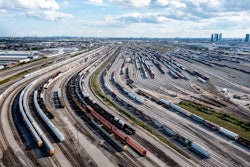Interest rates are rising, and all indications point toward that being an ongoing trend, but the absence of cheap loans and overall economic weakness haven't dampened motor carriers' interest in acquiring new assets like trucks and trailers.
Did you miss our recent webinar: "2023 Outlook for Trucking"?
Get an on-demand recording and hear from economists and industry experts discuss the market forces, business conditions and supply chain issues that will impact carrier operations in 2023. This complimentary CCJ webinar was sponsored by Bestpass.
ACT President and Senior Analyst Kenny Vieth expects the Federal Reserve to continue aggressively raising interest rates as long as inflation remains elevated, adding "not only has the Fed telegraphed this aggressive stance, but economic data suggest the Fed has little choice. It is our view the Fed will continue on its course of tighter monetary policy as still deep-pocketed consumers and businesses drive demand for labor in structurally constrained labor markets.”
In the release of its Commercial Vehicle Dealer Digest, ACT Research reported a slightly raised 2022 GDP forecast despite current economic activity, but analysts continue to expect a decline in 2023.
Factors mitigating a sharp commercial vehicle market downturn in 2023 include pent-up demand and the potential for some pre-buying.
Carrier profits are the critical element in vehicle demand and profits next year are anticipated to be lower, "but even modeling a sharp downturn — the worst since 2007 — truckload net margins are projected to be the fourth best on record.”
Even with demand intact, truck and trailer manufactuers face measured build rates thanks to shortages of certain components and limited labor availability along assembly lines. However, those conditions recently have taken a turn for the better.
“Recent discussions indicate U.S. trailer OEM business conditions are on-par with September and seem to be getting better,” said Jennifer McNealy, director of commercial vehicle market research and publications at ACT Research. "Demand remains healthy, cancellations are low and material/component supply-chain constraints are narrowing."
With the availability of 2023 build slots varying widely by OEM – complicated by already long backlogs – McNealy said customers’ ability to place orders is limited.
The biggest impact inflation has had on orders to-date is in equipment pricing, as McNealy said difficulty in projecting part and material prices has made it tough for manufacturers to set firm prices for current orders.
"That said, most are re-pricing orders with customers as production is set to commence," she said. "While we welcome improvements, reports from the field indicate that supply-chain constraints or tight labor markets are not a thing of the past just yet. We expect production levels to remain relatively constant in the near term.”











